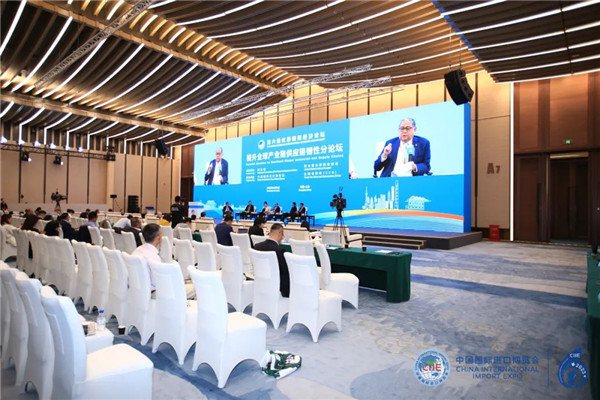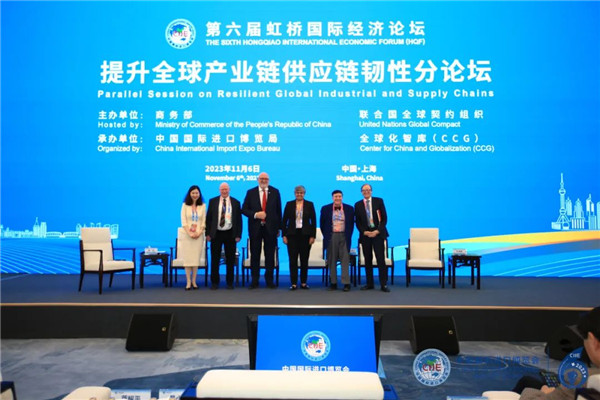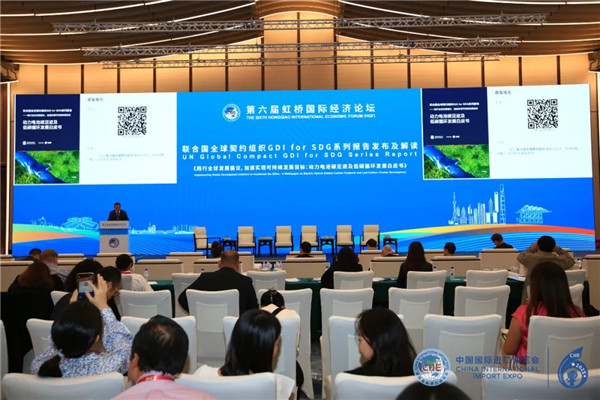CCG Holds Forum on Global Industrial Supply Chains at CIIE
November 06 , 2023[English]
【Chinese】
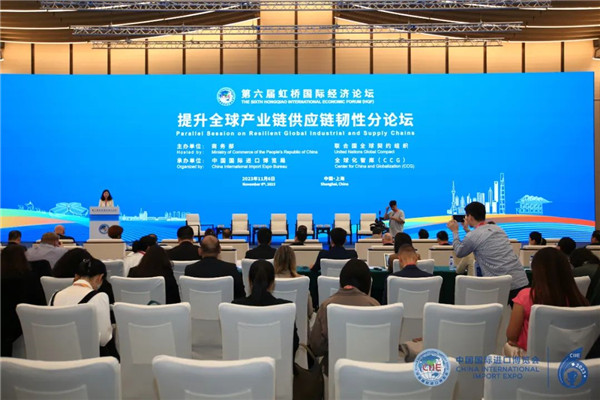
On November 6, 2023, the 6th China International Import Expo and Hongqiao International Economic Forum sub-forum “Resilient Global Industrial Supply Chains” was successfully held at the National Convention and Exhibition Center in Shanghai, jointly organized by the Ministry of Commerce and the United Nations Global Compact, and co-hosted by CCG and the China International Import and Exposition Bureau. CCG is the think tank partner for this year’s Hongqiao International Economic Forum. Numerous renowned domestic and foreign experts and enterprise representatives participated in the forum to discuss development trends in global industrial chains and supply chains, China’s role, and other pressing topics, with the goal of putting the world economy on the right track toward sustained recovery.
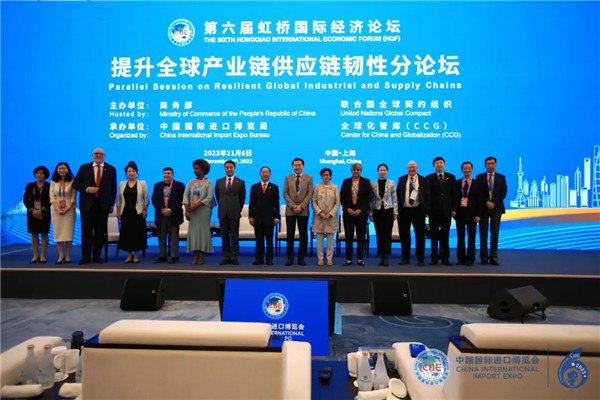
This forum included an opening ceremony, two round-table discussions and two report launches, focusing on the importance of global industrial chains and supply chains in economic globalization, and covering topics such as new trends in this area, the factors influencing these changes, a stable and resilient system for industrial and supply chains as well as China’s overall economic development.
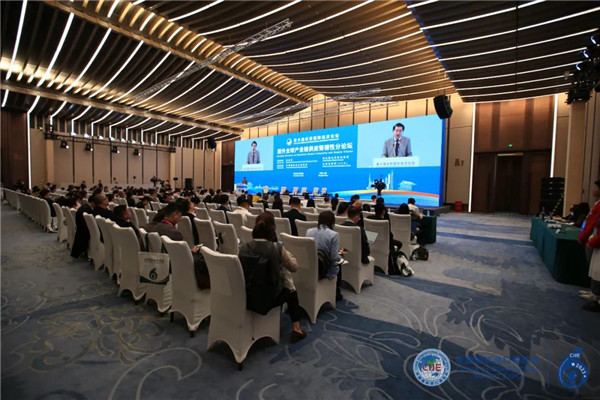
Dr. Henry Huiyao Wang, President of CCG and former Counselor of the State Council, delivered the opening speech. Yi Xiaozhun, former Vice-Minister of Commerce; Jiang Yaoping, former Vice-Minister of Commerce; Zhang Yong, Deputy General Manager of China Ocean Shipping Group; Arancha González, Dean of the School of International Affairs at Sciences Po and former Minister of Foreign Affairs, European Union and Cooperation of Spain; Sanda Ojiambo, Assistant Secretary General of the United Nations and Director General of the UN Global Compact; Amakobe Sande, current Representative of UNICEF in China, delivered keynote speeches during the forum.
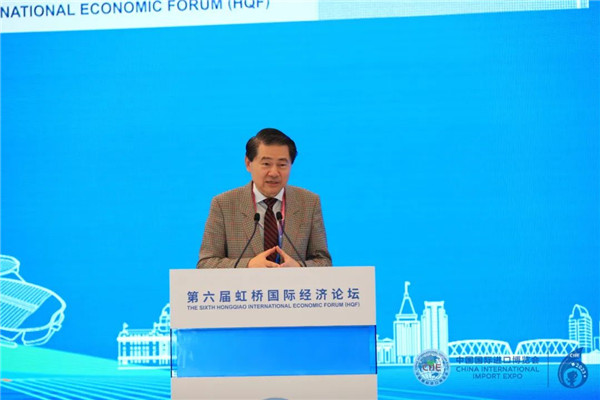
Wang Huiyao, President of CCG and former Counselor of the State Council, pointed out in his opening speech that the turbulent state of the world today has led to a trend toward regionalization and fragmentation of global industrial chains and supply chains, and caused global supply chains especially to become increasingly “short-chained”. However, China, which is at the center of the value chain and supply chain, is still favored by multinational companies. He emphasized the importance of the China International Import Expo as a platform to provide new public goods to the world. He also emphasized that in the future, CIIE and other conferences will both provide strong support for China, while also serving as platform for procurement that promote stability of industrial chains.
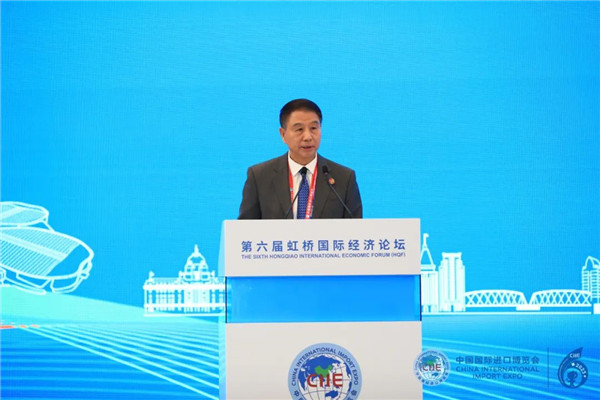
Yi Xiaozhun, former Vice Minister of Commerce, began by looking back at the boom in economic globalization after the end of the Cold War and resulting global supply chains, which brought the world three decades of high-growth and low-inflation, but also resulted in the financial crisis of 2008 from which the world recovered slowly. Secondly, he agreed with and quoted Chinese Premier Li Qiang when he met with the heads of Siemens, Volkswagen, Mercedes-Benz, BMW and other German enterprises in Germany this year that “risk prevention and cooperation are not opposites; non-cooperation is the biggest risk, and non-development is the biggest insecurity.” As the world faces a considerable risk of global economic downturn, he called on major powers to abandon the zero-sum thinking, return to multilateral cooperation under the framework of the WTO, and maintain open, stable and resilient global supply chains.
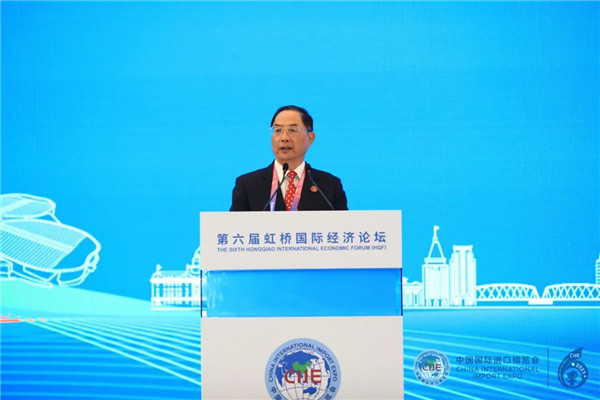
Jiang Yaoping, former Vice Minister of Commerce, elaborated on how digital trade can enhance the resilience of global industrial chains and supply chains. He pointed out that digital trade has created disruptive innovations in various fields through digital technology and digital services, which transform “impossible” into “possible”, “non-tradable” and “tradable”, and turn “traditional supply chains” into “digitalized supply chains”. This has accelerated changes and optimization in global industrial chains and supply chains, and injected new momentum into global economic growth. In addition, he also shared three key factors in accelerating the development of digital trade: innovation leadership, continued opening up, and win-win cooperation.

Zhang Yong, Deputy General Manager of China COSCO Shipping Group, said that, as President Xi Jinping pointed out at the Third “Belt and Road” Forum for International Cooperation, we should actively promote the development of “Silk Road Maritime Transportation” in terms of port development, navigation and trade integration, and accelerate the development of the BRI’s three-dimensional linking network, which is meant to promote the construction of a new type of port, shipping and trade ecosystem, integrate global production factors, smooth the global industrial chains and supply chains, and help promote a more open, inclusive, balanced and win-win model for economic globalization. To this end, COSCO Shipping Group is committed to the goal of being a world-class shipping technology company focusing on green low-carbon and smart digital systems to more rapidly achieve its strategic goals of resilient, green, low-carbon, intelligent and inclusive shipping, and a “Silk Road Shipping” ecosystem.
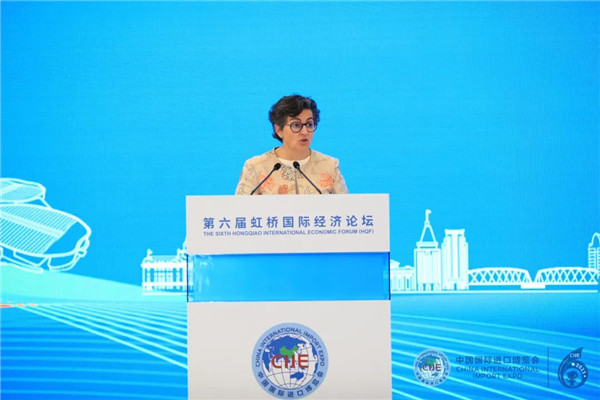
Arancha González, Dean of the School of International Affairs at Sciences Po and former Minister for Foreign Affairs, European Union and Cooperation of Spain, said that, firstly, companies had to focus on sustainable development; secondly, security was a challenge that could not be ignored. New risks, as well as old ones, could disrupt the entire value chain, which was why the industry had to redefine its approach to risk management; and thirdly, the application of new skills and technologies in trade in services would add to its development, but there were still competitive and regulatory issues to consider with regard to technology.
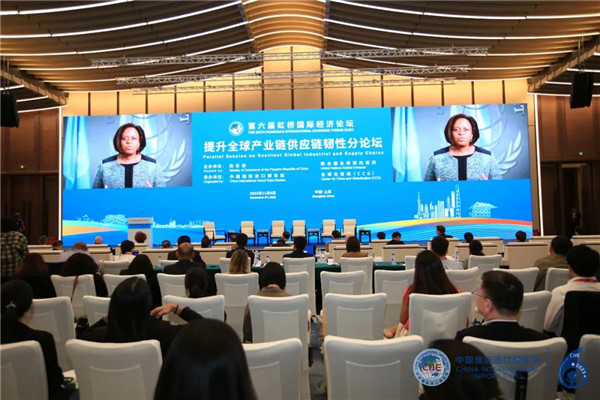
Sanda Ojiambo, Assistant Secretary-General of the United Nations and Director General of the United Nations Global Compact, argued that the current escalation and deepening of the global crisis is not a cause for optimism, but resilient green supply chains can be a key part of the solution, while innovation, as well as regional and global partnerships, are the key to building more sustainable and resilient supply chains. She announced that a special report would be released on the Global Development Initiative for SDGs (GDI for SDGs) pilot project, which was launched at the fifth China International Import Expo last year. By working together, she said, stronger businesses, more prosperous supply chains and a more just and resilient future could be built in China and globally.
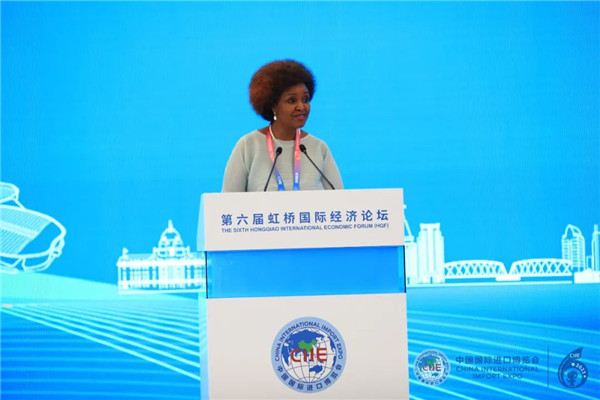
Amakobe Sande, UNICEF Representative in China, emphasized the importance of supply chains for UNICEF’s work. She noted that UNICEF’s supply chains should be agile, flexible, sustainable and, most importantly, resilient. To achieve this, UNICEF has strengthened its collaboration with suppliers, transporters and governments to improve its ability to anticipate, plan and deploy in-country logistics. Secondly, she said that China has been an important partner in all of this work, and that continued collaboration with Chinese suppliers will help to maintain supply chain resilience for the benefit of children. In addition, she suggested that the partnership should be further deepened, particularly with regard to strengthening local production in Africa, where China could make an important contribution in helping to establish larger supply centers for high-quality goods in Africa.
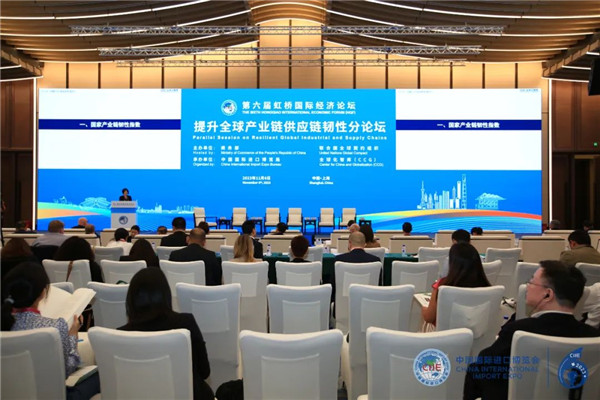
Maintaining the resilience of global industrial chains is key to guaranteeing the development of the world economy, and is in the common interest of the peoples of the world. The report of the 20th Party Congress clearly states that “efforts should be made to improve the resilience and security level of the industrial chain supply chain”. Against this background, a report titled “Talent, Innovation and Industry Chain Resilience Report (2023)”, developed by CCG Deputy Director Dr. Zheng Jinlian from CCG Research, was released at this forum. The report compares the performance of industrial resilience in five areas: talent capital, innovation resources, overall industry situation, manufacturing performance, and enterprise vitality by analyzing relevant data from 38 major countries, including China, with case studies that analyze new energy vehicle and semiconductor industry chains to assess the impact of talent and innovation on industry chain resilience. It also puts forward targeted recommendations for secure and stable development.
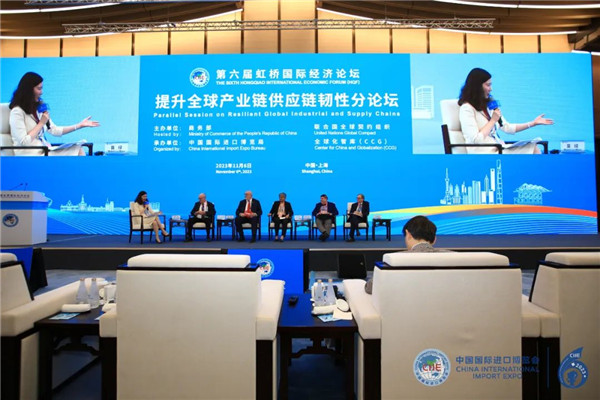
The first round of dialogue followed the theme of “New Trends in Global Supply Chains and Their Influencing Factors”. David Blair, Chief Economist of the International Federation of Talent Organizations (AGTO), Harvey Dzodin, Senior Fellow of CCG and former Vice President of ABC, Andreas Matthä, Chairman of Austrian Federal Railways, Vandita Pant, Chief Commercial Officer of BHP, and Jonathan Hua, President of McKinsey Global Institute, discussed how to build a global supply chain. Vandita Pant, Chief Commercial Officer of BHP Billiton (BHP), and Jonathan Watson, Director of McKinsey Global Institute, discussed a series of important issues of concern to Chinese and foreign enterprises, such as creating a resilient GSC industry chain and the role of new technologies in the transformation of global supply chains. The conversation was moderated by Mabel Lu Miao, Co-Founder and Secretary General of CCG and Initiator and Secretary General of GYLD (Global Young Leaders Dialogue).
Since the adoption of the 2030 Agenda for Sustainable Development by the United Nations in 2015, countries around the world have been working to realize the 17 Sustainable Development Goals (SDGs) to address the various major challenges facing the world today and to promote the creation of a more equitable, inclusive and sustainable future. At the forum, the United Nations Global Compact released a report titled “Practicing Global Development Initiatives, Accelerating the Achievement of the SDGs: a White Paper on the Carbon Footprint of Power Batteries and Low-Carbon Recycling Development”. The report focuses on multiple stakeholders across value chains in the new energy battery industry, including best practices and research on the recycling, reuse, and disposal of batteries throughout the entire life cycle as well as case studies on individual enterprises to promote a low-carbon and recycling-based economy. The report was jointly released by Liu Meng, Chief Representative of the Asia-Pacific Region of the United Nations Global Compact, and Sun Jie, Chief Sustainability Officer and General Manager of Carbon Management Business of Vision Tech Group.
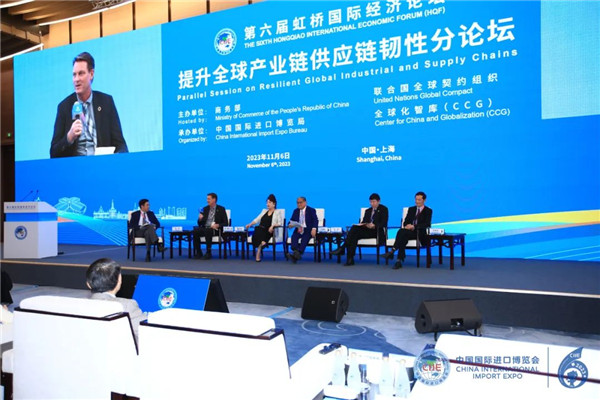
The second round of dialogue was themed “Stable and Resilient Industrial Supply Chain Systems and China’s Economic Development”. Feng Guojing, Chairman of Feng Group, He Weiwen, Senior Fellow of CCG, Co-Director of China-US-Europe Research Center of China Society of International Trade and Vice Chairman of Global SME Alliance, Ole Lund Hansen, Director of Global Operations of UN Global Compact, Ni Jun, Chief Manufacturing Officer of Ningde Times and Director of Pryuyuan Institute of Future Technology of Shanghai Jiaotong University, Zhai Jingli, Vice President of APP (China) of Cotai Group and Vice President of China Overseas Chinese Chamber of Commerce, discussed a series of important issues such as the key factors affecting global industrial chains and supply chains and how to develop a new fragmented supply chain. The dialog was moderated by Liu Hong, Deputy Director of CCG and former President of Greater China Region of DXC Technology Limited.
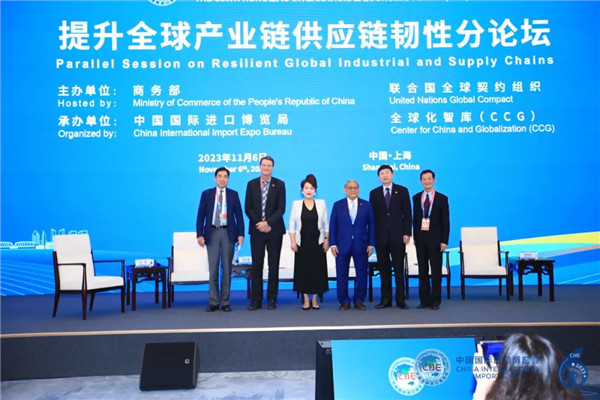
The China International Import Expo (CIIE) is the world’s first import-themed national-level exposition and a key initiative personally planned, proposed, deployed and promoted by President Xi Jinping. It is a pragmatic step by China to promote the development of an open world economy and support economic globalization, while also being a tangible application of China’s concept of a community with a shared future for mankind and its global development initiatives. The sixth China International Import Expo, themed “New Era, Shared Future”, was held from November 5-10, 2023 in Shanghai. This year’s expo attracted guests from 154 countries, regions and international organizations. More than 3,400 exhibitors and nearly 410,000 professional visitors registered for the event, representing a full recovery to pre-epidemic levels. Despite the many challenges facing the world economy, this global economic and trade expo has once again sent a strong message to the world that China will continue to open up to the world and share development opportunities with other countries.
